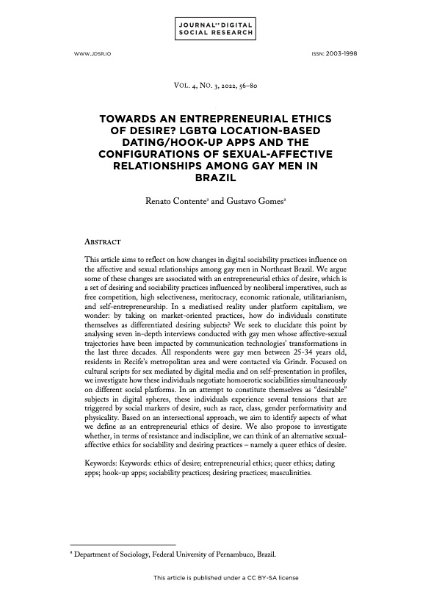Towards an Entrepreneurial Ethics of Desire? LGBTQ Location-based Dating/Hook-up Apps and the Configurations of Sexual-affective Relationships Among Gay Men in Brazil
DOI:
https://doi.org/10.33621/jdsr.v4i3.61Keywords:
dating apps, entrepreneurial ethics, queer ethics, hook-up apps, ethics of desire, sociability practices, desiring practices, masculinitiesAbstract
This article aims to reflect on how changes in digital sociability practices influence on the affective and sexual relationships among gay men in Northeast Brazil. We argue some of these changes are associated with an entrepreneurial ethics of desire, which is a set of desiring and sociability practices influenced by neoliberal imperatives, such as free competition, high selectiveness, meritocracy, economic rationale, utilitarianism, and self-entrepreneurship. In a mediatised reality under platform capitalism, we wonder: by taking on market-oriented practices, how do individuals constitute themselves as differentiated desiring subjects? We seek to elucidate this point by analysing seven in-depth interviews conducted with gay men whose affective-sexual trajectories have been impacted by communication technologies’ transformations in the last three decades. All respondents were gay men between 25-34 years old, residents in Recife’s metropolitan area and were contacted via Grindr. Focused on cultural scripts for sex mediated by digital media and on self-presentation in profiles, we investigate how these individuals negotiate homoerotic sociabilities simultaneously on different social platforms. In an attempt to constitute themselves as “desirable” subjects in digital spheres, these individuals experience several tensions that are triggered by social markers of desire, such as race, class, gender performativity and physicality. Based on an intersectional approach, we aim to identify aspects of what we define as an entrepreneurial ethics of desire. We also propose to investigate whether, in terms of resistance and indiscipline, we can think of an alternative sexual-affective ethics for sociability and desiring practices – namely a queer ethics of desire.
References
Adjepong A. Invading ethnography: A queer of color reflexive practice. Ethnography. 2019;20(1):27-46. https://doi.org/10.1177/1466138117741502
Bloom, P. (2017). The Ethics of Neoliberalism: The Business of Making Capitalism Moral. London, UK: Routledge.Bourcier, S. (2020). Homo Inc.Orporated: O triângulo e o unicórnio que peida. São Paulo, SP: n-1 edições.
Brown, W. (2019). In the Ruins of Neoliberalism: The Rise of Antidemocratic Politics in the West. New York: Columbia University Press.
Butler, J. (1990). Bodies that matter: on the discursive limits of “sex”. London, UK: Routledge.Butler, J. (1999). Gender Trouble: Feminism and the Subversion of Identity. New York, NY: Routledge.
Castells, M. (2009). The Rise of the Network Society: The Information Age: Economy, Society and Culture (Vol. 1). Hoboken, NJ: Wiley-Blackwell.
César, D. (2020). Região Nordeste possui quase metade de toda a pobreza no Brasil, segundo IBGE. Fundo Estadual de Combate à Pobreza do Ceará. Fecop. Retrieved from: https://www.fecop.seplag.ce.gov.br/2020/11/20/regiao-nordeste-possui-quase-metade-de-toda-a-pobreza-no-brasil-segundo-ibge.
Couldry, N., & Hepp, A. (2016). The Mediated Construction of Reality. A construção mediada da realidade. Cambridge, UK: Polity. E-book.
Danner, F. (2011). Biopolítica e liberalismo: a crítica da racionalidade política em Michel Foucault (PhD thesis). Retrieved from: http://tede2.pucrs.br/tede2/handle/tede/2874.
Dardot, P., & Laval, C. (20164). A The New Way of the World: On Neoliberal Society. London, UK: Verso.
Foucault, M. (1978). The History of Sexuality: An Introduction. New York, NY: Pantheon Books.
Foucault, M. (1980). Power/Knowledge: Selected Interviews and Other Writings 1972-1977. New York, NY: Pantheon Books.
Foucault, M. (1990). The History of Sexuality: The Use of Pleasure. New York, NY: Vintage Books.
Foucault, M. (2008). The Birth of Biopolitics: Lectures at the Collége de France 1978-1979. London, UK: Palgrave Macmillan.
Foucault, M. (2017). Subjectivity and Truth: Lectures at the Collége de France, 1980-1981. London, UK: Palgrave McMillan.
Gastaldi, A., Mott, L., Oliveira, J., Ayres, C., Souza, W., & Silva, K. V. C. (Orgs.). (2020). Observatório de mortes violentas de LGBTI+ no Brasil – 2020 (report).
Halberstam, J. (2011). The Queer Art of Failure. Durham, UK: Duke University Press.
Honneth, A. (1995). The Struggle for Recognition: The Moral Grammar of Social Conflicts. Cambridge, UK: The MIT Press.
Illouz, E. (2019). The End of Love: A Sociology of Negative Relations. Oxford, UK: Oxford University Press.
Illouz, E. (2011). O amor nos tempos do capitalismo. Rio de Janeiro, RJ: Zahar.
Lievrouw, L. (2014). Materiality and Media in Communication and Technology Studies: An Unfinished Project. Cambridge, UK: The MIT Press.
May, T. (2012). Friendship in an Age of Economics: Resisting the Forces of Neoliberalism. Lanham, MD: Lexington Books.
McGlotten, S. (2013). Virtual intimacies: media, affect, and queer sociality. New York, NY: Suny Press.
Miskolci, R. (2017). Desejos Digitais. Belo Horizonte, MG: Autêntica.
Preciado, P. (2018). Countersexual Manifesto. New York, NY: Columbia University Press.
Race, K. (2015). ‘Party and Play’: Online hook-up devices and the emergence of PNP practices among gay men. Sexualities, 18(3), 253-275. https://doi.org/10.1177/1363460714550913.
Raj, S. (2011). Grindring Bodies: Racial and Affective Economies of Online Queer Desire. Critical Race and Whiteness Studies, 7 (2), 1 -12.
Rooke, A. (2010). Queer in the Field: On Emotions, Temporality and Performativity in Ethnography. In Browne, K., & Nash, C. (Eds.). Queer Methods and Methodologies: Intersecting Queer Theories and Social Science Research. Surrey, UK: Ashgate.
Santos, J. M. (2020). Recife é a capital mais desigual do Brasil. Pernambuco está em terceiro lugar em desigualdade entre os estados, mostra IBGE. Blog de Jamildo. Retrieved from: https://m.blogs.ne10.uol.com.br/jamildo/2020/11/12/recife-e-a-capital-mais-desigual-do-brasil-pernambuco-esta-em-terceiro-lugar-em-desigualdade-entre-os-estados-mostra-ibge.
Seidman, I. (2006). Interviewing as Qualitative Research. New York, NY: Teachers College.
Setiffi, F. (2014). Becoming consumers: Socialization into the World of Goods. Italian Journal of Sociology of Education, 6(3), 6-25. Retrieved from: http://www.ijse.eu/wpcontent/uploads/2014/10/2014_3_2.pdf.
Srnicek, N. (2016). Platform Capitalism. Cambridge: Polity Press.
Van Dijck, J., Poell, T., & Martin, W. The Platform Society: Public Values in a Connective World. New York, NY: Oxford University Press EUA.
Vidarte, P. (2007). Ética marica: Proclamas libertarias para uma militancia LGBTQ. Sevilla, Spain: Egales.
Wu S, Ward J. Looking for “interesting people”: Chinese gay men’s exploration of relationship development on dating apps. Mobile Media & Communication. 2020;8(3):342-359. https://doi.org/10.1177/2050157919888558
Xavier, M. (2016). Subjectivity Under Consumerism: The Totalization of the Subject as a Commodity. Psicologia & Sociedade, 28(2), 207-216. https://doi.org/10.1590/1807-03102016v28n2p207.

Downloads
Published
Issue
Section
License
Copyright (c) 2022 The Authors

This work is licensed under a Creative Commons Attribution-ShareAlike 4.0 International License.



